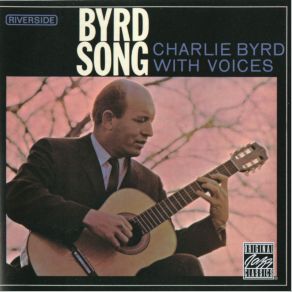Byrd Song
Download links and information about Byrd Song by Charlie Byrd. This album was released in 1965 and it belongs to Jazz, Latin, Bop genres. It contains 12 tracks with total duration of 35:32 minutes.

|
|
|---|---|
| Artist: | Charlie Byrd |
| Release date: | 1965 |
| Genre: | Jazz, Latin, Bop |
| Tracks: | 12 |
| Duration: | 35:32 |
| Buy it NOW at: | |
| Buy on iTunes $9.99 | |
| Buy on Amazon $9.49 | |
Tracks
[Edit]| No. | Title | Length |
|---|---|---|
| 1. | I Left My Heart In San Francisco | 3:28 |
| 2. | Who Will Buy? | 3:12 |
| 3. | The Night We Called It a Day | 2:20 |
| 4. | Wildcat | 2:26 |
| 5. | A Felicidade | 2:38 |
| 6. | Action Painting | 3:02 |
| 7. | This Can't Be Love | 2:35 |
| 8. | Let's Do It | 3:21 |
| 9. | God Bless the Child | 2:44 |
| 10. | My Favourite Things | 4:12 |
| 11. | Swing '59 | 3:18 |
| 12. | Born to Be Blue | 2:16 |
Details
[Edit]"Charlie Byrd With Voices" is an odd subtitle for this mid-'60s album, considering that vocals are only heard sporadically; that voices aren't even heard on some of the tracks; and that, when the vocals are heard, they're wordless background choral bits, not a vocalist or vocalists actually singing lyrics. In truth, it seems like a gimmick or an attempt to sell the album to a crossover audience, the vocal component of the record feeling like an afterthought. And not an especially inspired one, either; the white-bread soothing choruses sound like refugees from straight easy listening records. The album's actually for the most part a typical, if low-key, Byrd session, on which his only instrumental accompaniment consists of Keter Betts on bass and Bill Reichenbach on drums. Just a couple of Byrd originals, "Action Painting" and "Swing 59," are on a collection slanted toward covers of popular standards, including "I Left My Heart in San Francisco," Lionel Bart's "Who Will Buy?," Antonio Carlos Jobim's "Felicidade," Rodgers & Hart's "This Can't Be Love," Cole Porter's "Let's Do It," Rodgers & Hammerstein's "My Favorite Things," and Billie Holiday's "God Bless the Child." When played just by the trio, it's fine, with sterling Byrd guitar, though the less sappy and more forceful material (like "Wildcat") overshadows the more conventional romantic standards. When those voices enter, though, it treads on the annoyingly saccharine.